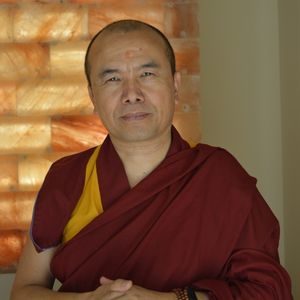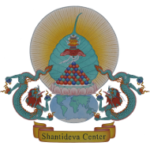Nagarjuna's Commentary on the Awakening Mind (Bodhicittavivārana)
with Geshe Dorji Damdul
A happy mind is tranquil indeed;
A tranquil mind is not confused;
To have no confusion is to understand the truth;
By understanding the truth one attains freedom.
– Nagarjuna, A Commentary On The Awakening Mind (v. 70)
The Greek word Eudaimonia (literally “the state of having a good indwelling spirit”) refers to a state of optimal flourishing and well-being that is independent of circumstances. From a Buddhist perspective, the components of Eudaimonia encompass both: insight into the nature of reality and unbiased compassion for all beings.
With profound insight and wisdom, Geshe Dorji Damdul will guide us through Nagarjuna’s Commentary on the Awakening Mind (Bodhicittavivāraṇa) so that we can cultivate tranquility and awaken (bodhi) to the actual nature of existence. Please join us for this rare opportunity to cultivate great compassion and wisdom with an exceptional scholar and practitioner.
Additional Materials
- Preliminary Prayers: pages 21-26 in (PDF) (pages 3-8 in the hard copy)
- Text – Praise to Shakyamuni Buddha: pages 32 & 33 in (PDF) (pages 14 & 15 in hard copy)
- Heart Sutra Mantra: page 49 in (PDF) (page 31 in hard copy) “TADYATHĀ (OM) GATE GATE PĀRAGATE PĀRASAMGATE BODHI SVĀHĀ”
- Aspirational Bodhicitta Verses (PDF)
- Additional Dedication Prayers – Version A (PDF)
- Additional Dedication Prayers – Version B (PDF)
- Additional Dedication Prayers – Version C (PDF)
- Additional Dedication Prayers – Version D (PDF)
Recordings
This is a playlist. To jump to a particular session, click the playlist icon (near the top-right corner) of the video frame to select video.
About the Teacher
 Ven Geshe Dorji Damdul is presently Director at Tibet House, New Delhi, Cultural Centre of His Holiness the Dalai Lama. In 1988, Geshe Dorji Damdul joined the Institute of Buddhist Dialectics, Dharamsala for formal studies in Buddhist logic, philosophy and epistemology. After 15 years of study in Buddhist philosophy he finished his Geshe Lharampa Degree (Ph.D.) in 2002 from Drepung Loseling Monastic University. He joined Gyudmed Tantric College for a year for Tantric studies.
Ven Geshe Dorji Damdul is presently Director at Tibet House, New Delhi, Cultural Centre of His Holiness the Dalai Lama. In 1988, Geshe Dorji Damdul joined the Institute of Buddhist Dialectics, Dharamsala for formal studies in Buddhist logic, philosophy and epistemology. After 15 years of study in Buddhist philosophy he finished his Geshe Lharampa Degree (Ph.D.) in 2002 from Drepung Loseling Monastic University. He joined Gyudmed Tantric College for a year for Tantric studies.
In 2003, the Office of H.H. the Dalai Lama sent him to Cambridge University, England for Proficiency English studies. He was a visiting fellow at Girton College, Cambridge University.
He is appointed as the official translator to H.H. the Dalai Lama since 2005. He has been serving as the interpreter for H.H. the Dalai Lama for so many years and at the same time involved in doing written translations of many texts from Tibetan into English such as Arya Nagarjuna’s “Mulamadyamikakarika” (Fundamental Wisdom of the Middle Way), Acharya Shantideva’s “Bodhicaryavatara” (Wisdom Chapter).
He was appointed as the Director of Tibet House, Cultural Centre of H.H. the Dalai Lama, New Delhi in March 2011.
As assigned by the Office of H.H. the Dalai Lama, he visited the US in 2008 to work with Prof. Paul Ekman, a world renowned Psychologist, one of the pioneers of the science of micro-facial expressions, on H.H. the Dalai Lama’s book “Emotional Awareness” which is co-authored by Dr. Paul Ekman of the University of California Medical School.
His Holiness the Dalai Lama also assigned him with a text book project. He was one of the chief editors for the text book on Buddhist Science and Philosophy. This text book is to be used for Centres and Institutes all over the world to study more thoroughly on Buddhist philosophy, metaphysics, epistemology, and science.
He was also assigned, along with few other scholars to work on H.H. the Dalai Lama’s book “Ethics for the New Millennium – Part II, later came up with the title Beyond Religion,” and the series of “Art of Happiness” book which were jointly written by H.H. the Dalai Lama and Prof. Howard Cutler. Likewise he is actively involved in critical editing works with other books of H.H. the Dalai Lama like “The Graded Path.”
He was affiliated with Drepung Loseling Library where he served as the editor of Dreloma Magazine for eight years from 1994-2001. Prior to that he was the editor and contributor for 5 years for “Lhaksam Tsekpa” – a journal of comparative studies, the theme of which is on Modern Science and philosophy, published by the Institute of Buddhist Studies.
He wrote a number of important papers for National and International Conferences held in Delhi University, and so forth. The papers constitute topics such as “The Paradox of Brain and Mind” and “The Ultimate Reality According to Arya Nagarjuna.”
He is in the process of writing two important books, one on “Journey into the Paradox of Brain and Mind” and the other on “What Constitutes the Ultimate Reality: The Effects of Understanding the Ultimate Reality.”
In 2004 – 05, for two years, he was assigned as the Philosophy Lecturer for the Emory University Study Abroad Program which was being held in Dharamsala, India since 2001.
In 2008, he was appointed as a visiting fellow in Delhi University to give lectures in three of the University’s departments – Philosophy, Psychology, and Buddhist Studies.
In 2011, Indira Gandhi National Open University recruited him as one of the chief experts to design the syllabi for B.A. and M.A. course on Tibetan Studies as a part of Indira Gandhi National Open University (IGNOU) program.
While assigned with the responsibility of the Directorship of Tibet House, the Cultural Centre of H.H. the Dalai Lama, New Delhi, India, he also gives regular lectures in Tibet House and many other places like Universities and Institutes. He also travels widely within India and abroad, like Mumbai, USA, U.K., and Singapore to teach Buddhist philosophy, psychology, logic and practice.


